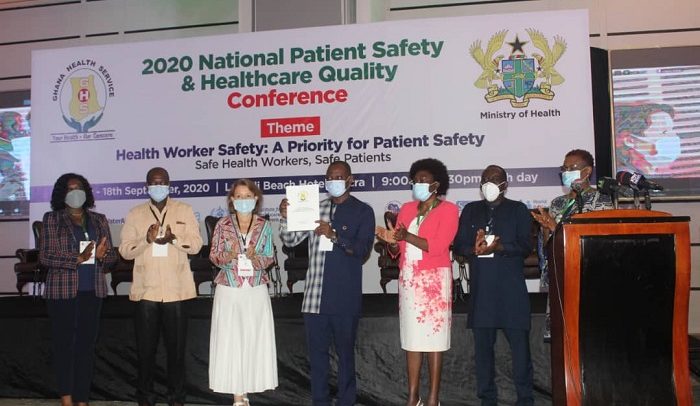Dr. Kuma-Aboagye (middle) with the new guideline for the implementation of the national healthcare strategy
The Ghana Health Service (GHS) in an effort to boost the safety of patients who visit the various healthcare facilities to seek medical attention, has launched a new guideline for the Implementation of the National Healthcare Quality Strategy.
The guideline aims to ensure patient safety by establishing and strengthening the science-based systems necessary for improving the quality of health care, while giving the issue top priority in health sector policies.
The document was launched at the opening session of a two-day conference to commemorate the 2020 World Patient Safety Day in Accra.
The Day marked on September 17, was adopted by the 72nd World Health Assembly in May 2019, to call for Global Action on Patient Safety and increase public awareness and engagement.
The Conference held on the theme; “Health Worker Safety: A Priority for Patient Safety,” brought together multiple stakeholders including healthcare professionals, to share knowledge and brainstorm on lessons leant from past events such as the Covid-19 pandemic to prevent future patient healthcare emergencies.
Statistics from the World Health Organisation (WHO) show that four out of every 10 patients who visit healthcare facilities globally, are harmed while receiving care in lower-medium income countries.
In her key note address, acting WHO Country Representative, Dr Neema Rusibamayila Kimambo, called for strengthened stakeholder collaboration, and the need for all to speak up for patient safety.
She said patient safety, should be made an essential component for strengthening healthcare systems to achieve Universal Health Coverage (UHC).
Dr Kimambo, however, noted that recognising patient safety could not be ensured without access to safe infrastructure, technologies and medical devices, and a skilled and committed health workforce and in an enabling and safe environment.
Dr Kimambo commended all healthcare professionals, especially frontliners, for their courage, commitment and sacrifices in facing the Covid-19 pandemic, which has led to over 41,000 (about 3.8 per cent) of these workforce in the African Region alone, getting infected with the virus, with many more unaccounted for.
She said observing Water, Sanitation and Hygiene (WASH) practices in healthcare facilities was one of the effective ways of achieving infection prevention.
Dr Patrick Kuma-Aboagye, the Director-General of the Ghana Health Service (GHS), admitted that in Ghana medical, surgical, and healthcare acquired infections often occurred through medication errors such as dispensing wrong medication and infusions, in surgeries, and insanitary environment among others.
However, he said the GHS had over the years developed several safety and quality assurance documents, including the Community Score Cards, the Patient Charter, and the National Healthcare Quality Strategy, to guide practitioners and provide stakeholder education, he said.
UNICEF Country Representative, Anne-Claire Dufay, also acknowledged the enthusiasm and commitment of health workers in the just ended nationwide Expanded Polio Immunisation exercise, and their strong quest to protect themselves against Covid-19 infections as they worked.
She pledged the continuous support of UNICEF towards the provision of WASH facilities in healthcare facilities and urged the government to further enhance investment in health worker safety to protect patients.
By Jamila Akweley Okertchiri


